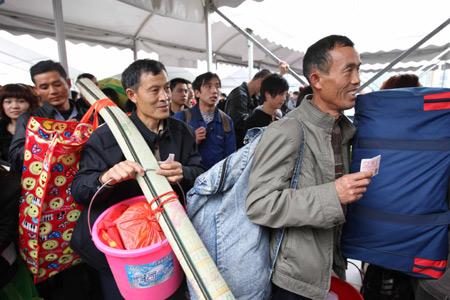
Migrant workers queue in Guangzhou railway station, Guangdong province, on Wednesday. Many workers choose to go back home earlier to avoid the traffic peak of the Spring Festival. [China Daily]
Zhou Taocan's garment company had few customers during the first half of last year. But now, as his business is picking up, he can't find enough workers.
"Businesses are bouncing back. We are looking for more workers," said Zhou, general manager of a Hong Kong-funded garment company based in the manufacturing city of Dongguan.
The company cut its employees from 500 to 300 in the first half of last year due to reduced overseas orders following the global financial crisis.
"But we faced a shortage of workers in the second half of the year since businesses are picking up," Zhou said.
Zhou's company is not alone. Many factories in the Pearl River Delta region in Guangdong province, a major economic powerhouse in South China, cannot find enough workers as their businesses recovered in the second half of last year.
"We found it hard to hire skilled workers in the last year, especially at the year's end, as a growing number of workers returned to their homes earlier than before," a manager surnamed Chen with Guangdong Aihua Group.
The Shantou-based company, which mainly produces woolen garments, is in need of more workers this year as it has expanded production lines, Chen said.
Sources with Guangdong foreign economic and trade authorities said Guangdong's exports will see an annual increase of 10 percent this year, which means more workers are needed as orders increase.
"We have to upgrade technology and facilities to reduce the use of more workers. And we will increase salaries and welfares to attract skilled workers," Chen said.
Sources with Dongguan labor and social security authorities said that the job requirement rate in the city hit nearly 1:2 last month, which means one worker is offered two jobs.
"It is unusual since the rate used to be lower in previous years," Chen Weibiao, general manager of Dongguan Sanhe Human Resource Center, told China Daily.
Only about 1,000 workers were looking for jobs at a job fair last month in Zhongshan, another manufacturing city in Guangdong. At the fair, companies were offering about 5,000 jobs.
"We are planning to organize more job fairs for local companies to hire workers," Chen said.
At Guangzhou railway station on Friday, a 35-year-old migrant worker surnamed Zhou said he would not come back to the province after the Spring Festival.
"I want to find a job in inner regions or probably open my own business," said Zhou, carrying two bags at the railway station and preparing for a train back to his hometown, Anhui province.
"My salary was not increased last year. Friends have told me my current salary is almost the same as theirs in my hometown," said Zhou, who has been working in a toy factory in Shenzhen for three years.
The shortage of workers may drag small- and medium-sized enterprises into a "crisis" because the economic rebound has not been based on a solid foundation, said Liang Guiquan, a researcher with Guangdong provincial situation study and research center.
But Liang said that the worker shortage may help speed up industry upgrading and migrant worker utilization in the Pearl River Delta area.
"Companies, if they want to hire fewer workers, should do more in facilities and technology upgrading," Liang said.





